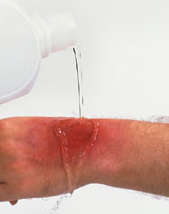Common Symptoms of Colds & Sore Throat
Both these conditions are self limiting. That is to say most will get better on their own in a short period of time.
Throats-upper respiratory
About 70% of sore throats are viral and so antibiotics are not suitable. A lot of inflamed throats only last a few days, but ones lasting more than a week should see their GP. Also repeated sore throats and ones lasting more than a week, especially in teenagers and young adults, should also see their health provider.
If there is redness and inflammation along with white spots on the tonsils, then this is probably a bacterial infection and a penicillin-type antibiotic will help. Again, time to see your health care provider. Other times you’ll need to visit your Doctors surgery are if you have large and tender lymph nodes in the neck and if there is difficulty in swallowing liquids or saliva. There are other rarer causes such as quinsy, but these are seen much less in community pharmacy setting.
Other accompanying conditions can be present are
- Earache– which should be seen at your surgery can be caused by bacterial infections.
- Fever– is quite common to both bacterial/viral infections. Combine, with a long-term sore throat & swollen glands with night sweats – see your GP.
- Hoarseness– or Laryngitis can be quite common, but if lasting over a week or is getting worse you’ll be better off going to see your Doctor at the surgery.
- Skin Rash– with sore throat, if you have just started a new medicine pop over to your local pharmacy and ask about potential drug interactions.
- Malaise– is where you feel tired, really run down and unwell. Often accompanied with viral infections. If you have a severe malaise with other signs or symptoms go to see your GP.
- Myalgia– is common in viral infections and is where you feel lots of aches and pains.
Head Cold-upper respiratory
It can often be present with a sore throat as discussed above. It’s also called infectious Rhinitis. Most colds last a few days but sometimes can last up to a fortnight. You get similar symptoms with allergy especially in summer when it’s call Hay Fever.
If you are unsure drop into your local Pharmacy and speak to the Pharmacist.
The main symptoms are
- Sneezing– continuous through infection. If it comes on suddenly for a short period and leaves your nose runny and itchy, then this will probably be allergic rhinitis.
- Congestion– excess mucus in the nasal passage often starts clear then can turn discoloured and purulent. In an allergy, the mucus stays clear.
- Rhinorrhoea– a runny nose comes with congestion
All of these symptoms can be helped by a visit to your community pharmacy where there are various medicines that you can buy over the counter.
Other symptoms may include
- Conjunctivitis
- Myalgia
- Cough
- Sinusitis
The general advice for colds and sore throats are just symptomatic. That is to take some Aspirin(not under 16 years of age) or Paracetamol, keep warm and rested, drink fluids.
The pharmacy has many choices to help alleviate the severity of the symptoms. Topical or oral decongestants, Antihistamines, Intranasal sprays, rubs or inhalations, Lozenges and anaesthetic/anti-inflammatory sprays.




